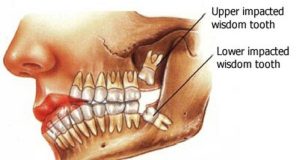Get This Report on Tooth Removal
Review Knowledge tooth extraction is an operation to eliminate one or even more knowledge teeth the four long-term grown-up teeth located at the back corners of your mouth on the top and bottom. If a wisdom tooth does not have space to expand (influenced wisdom tooth), resulting in pain, infection or other oral troubles, you'll likely need to have it drew.
To stop potential future issues, some dentists and dental specialists suggest wisdom tooth extraction also if affected teeth aren't currently creating troubles. Why it's done Wisdom teeth, or third molars, are the last irreversible teeth to show up (appear) in the mouth. These teeth normally show up between the ages of 17 as well as 25.

For others, wisdom teeth erupt generally simply as their other molars did and cause not a problem. Lots of people develop impacted wisdom teeth teeth that don't have sufficient room to appear right into the mouth or create normally. Affected knowledge teeth might erupt just partly or otherwise in any way. An affected knowledge tooth may: Expand at an angle towards the following tooth (2nd molar) Grow at an angle toward the rear of the mouth Grow at an ideal angle to the other teeth, as if the knowledge tooth is "resting" within the jawbone Grow directly up or down like other teeth however remain entraped within the jawbone Issues with influenced wisdom teeth You'll likely require your influenced wisdom tooth drew if it leads to issues such as: Pain Trapping food and debris behind the knowledge tooth Infection or gum condition (gum disease) Dental cavity in a partly appeared knowledge tooth Damage to a close-by tooth or bordering bone Advancement of a fluid-filled sac (cyst) around the knowledge tooth Complications with orthodontic treatments to straighten various other teeth Preventing future dental problems Oral experts disagree about the value of extracting impacted wisdom teeth that aren't triggering issues (asymptomatic).
Tooth Extraction Can Be Fun For Anyone
However, below's the rationale for preventive extraction: Symptom-free wisdom teeth can still harbor disease. If there isn't adequate area for the tooth to emerge, it's often hard to obtain to it and tidy it correctly. Major difficulties with wisdom teeth take place much less typically in more youthful grownups. Older grownups may experience problem with surgical treatment and problems after surgical treatment.
Nonetheless, elimination of impacted knowledge teeth occasionally requires a surgical approach that involves making a cut in the periodontal cells and also removing bone. Hardly ever, difficulties can include: Painful dry outlet, or exposure of bone when the post-surgical embolism is shed from the site of the medical injury (socket) Infection in the socket from germs or trapped food particles Damage to close-by teeth, nerves, jawbone or sinuses Just how you prepare Your dental practitioner may execute the procedure in the workplace.

Along with making the area numb with neighborhood anesthetic, your specialist may recommend sedation to permit you to be much more comfy during the procedure. dental care dentist Concerns to ask Questions you might wish to ask your dentist or oral doctor consist of: The number of knowledge teeth need to be eliminated What sort of anesthesia will I get Exactly how difficult do you expect the treatment to be Exactly how lengthy is the treatment likely to last Have the influenced knowledge teeth created damage to various other teeth Exists a risk that I may have nerve damages What other oral therapies might I need at a later day For how long does it require to totally heal and return to normal activity Preparing for surgical procedure A knowledge tooth extraction is usually executed as an outpatient treatment.
9 Easy Facts About Wisdom Teeth Removal Explained
You'll obtain instructions root canal treatment from the medical facility or oral clinic personnel on what to do before the surgical treatment and also the day of your set up surgery. Ask these concerns: Will I need 4 teeth pulled at once to make plans for someone to drive me residence after the treatment When do I need to get to the oral center or health center Do I require to avoid eating food or drinking liquids or both (quickly) If so, when do I start Can I take my prescription drugs prior to the surgical treatment If so, exactly how quickly before the surgery can I take a dose Needs to I prevent any nonprescription drugs before the surgery What you can anticipate During the procedure Your dental expert or oral doctor might use among 3 kinds of anesthetic, relying on the expected intricacy of the wisdom tooth extraction and your comfort degree.
Your dental practitioner or dental surgeon carries out local anesthetic with one or even more shots near the site of each extraction. Before you get a shot, your dental expert or specialist will likely use a compound to your gum tissues to numb them. You're awake during the tooth extraction. Although you'll really feel some stress as well as motion, you should not experience discomfort.

Your dentist or oral specialist provides you sedation anesthetic via an intravenous (IV) line in your arm. Sedation anesthesia suppresses your awareness throughout the treatment. You do not really feel any kind of discomfort and will have limited memory of the treatment. You'll additionally obtain regional anesthetic to numb your periodontals. General anesthetic. In unique circumstances, you may be offered basic anesthesia.